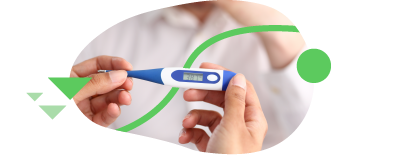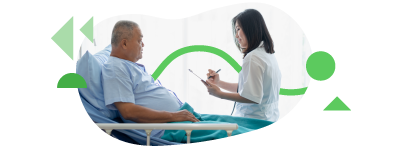Covid-19 Medical Bill Reliefs in Singapore - What If You Get Infected?
As the Covid-19 situation is a pandemic, there's a very real chance that we might get infected with the virus (despite our best efforts). What should you do if you suspect that you might have Covid-19? How much are the medical bills - and do you have to pay?

What Are the Symptoms of Covid-19?
Since Covid-19 is a respiratory tract disease, its symptoms can be quite similar to common illnesses such as colds and flu. In fact, according to the Ministry of Health, Covid-19 symptoms are similar to that of pneumonia. Below are the Covid-19 symptoms from the government's Covid-19 Symptom Checker (sgcovidcheck.gov.sg):

Fever >37.5°C
Difficulty Breathing
Cough
Sore Throat
Loss of Taste / Smell
Diarrhoea
Body Ache
Runny Nose
What Should You Do If You Have Covid-19 Symptoms?
Check the Covid-19 Symptom Checker for advice on what you should do next. The recommendations will depend on your scenario (e.g. exposure to infected persons) and the severity of your symptoms.
Generally, if you have any of the mild symptoms (those similar to the common cold), you should see a GP. If you are a Singapore citizen or PR, you can get subsidised GP consultation fees at polyclinics and Public Health Preparedness Clinics (PHPCs).
If you have severe symptoms, such as breathing difficulties, you should call 995 or go to any hospital's Emergency Department (A&E) to get medical treatment ASAP.
When seeking treatment, your doctor will advise you on any next steps. If you need to be tested for Covid-19, the government will pay for your testing fees (as well as subsequent treatment).
What If You Are Placed Under Quarantine?
If you have been in close contact with a confirmed Covid-19 carrier, you may be placed under a 14-day quarantine by the Ministry of Health. While under quarantine, you must stay home and monitor your health while liaising with an MOH officer several times a day. If staying at home is not feasible, you can ask to be housed in a government-provided isolation facility - your stay and daily meals will be provided for free.

What About Your Income?
Unless you have remote working arrangements, you will NOT be able to go to work while under quarantine. So be prepared for some impact to your income, especially if you're self-employed. That said, the following arrangements might help.
Leave Arrangement
Your absence from work will be counted as medical/hospitalisation leave. It should not count as annual leave.
Quarantine Allowance
If you are an employee, your employer can claim S$100 per day of quarantine. If self-employed, you can claim S$100 per day.
More Assistance
For extra financial assistance, low-income households may get S$500 to S$1,000 from the Courage Fund.
Do You Need to Pay Your Own Covid-19 Medical Bills?
Don't worry if your savings aren't sufficient to cover a medical emergency like getting Covid-19. The government will foot the medical bills for most Covid-19 cases in Singapore. All testing fees will be paid by the government. If you are tested to have Covid-19, you will be placed in a public hospital or medical care facility allocated by the government. You will be hospitalised and treated for free as long as you are a Singapore citizen, PR, or long term pass holder.
Notable Exceptions
If you are a foreigner with a short term visit pass, you will have to pay for your own medical treatment and hospital stay. Also, those who ignore travel advisories and chose to travel from 27 March 2020 will have to pay for their own medical bills, regardless of citizenship.


What If You Need More Cash?
Despite the government's efforts to alleviate the financial burden of catching Covid-19 and getting treated, there are a few who may fall through the cracks. Or perhaps the financial assistance just isn't enough to help with your short-term cashflow needs. If you need a personal loan to tide you through - and are confident you can repay - use MoneySmart's personal loan calculator to find the lowest interest rates.
Can You Get Additional Covid-19 Insurance Coverage?
While you won't have to pay for most of the Covid-19 medical bills out of your own pocket, you may get further financial benefits if you have an existing health or life insurance plan. That's because many major insurers in Singapore now feature Covid-19 coverage in their insurance policies. Below is a round-up of Covid-19 insurance benefits for hospitalisation income and lump-sum payouts for critical condition or death.

Covid-19 Insurance Coverage in Singapore
| Insurer | Hospitalisation Benefit | Death Payout |
|---|---|---|
| AIA | S$1,000 lump sum | S$25,000 |
| AXA | S$200 per day | S$20,000 |
| Etiqa | S$100 per day (S$200 per day if in ICU) | S$50,000 |
| Great Eastern | S$200 per day | S$20,000 |
| HSBC | S$200 per day + S$1,000 lump sum | S$10,000 |
| Manulife | S$1,500 or S$2,000 lump sum | S$30,000 |
| Income | S$100 per day | S$10,000 |
| Prudential | S$200 per day (S$500 lump sum if quarantined) | - |
Frequently Asked Questions
How do I get tested for Covid-19?
- According to the Ministry of Health, Covid-19 testing is free of charge in Singapore. However, you can't simply go to your doctor and ask for a test. Your doctor will assess your health and travel/contact history, and, only if there is a need for a test, either administer it or refer you to a hospital with testing facilities.
What is the treatment for Covid-19?
- As yet, there is no proven treatment or medicine against Covid-19 - scientists are still working on a cure. Currently, medical treatment consists of supporting the patient's immune system in self-recovery. Most people who catch Covid-19 do recover, but the process may take several weeks.
Are discharged coronavirus disease patients infectious?
- According to the Ministry of Health, Covid-19 patients in Singapore are discharged only when they have fully recovered and no longer infectious. Patients must undergo a series of tests to make sure they are no longer harbouring the virus before they are released.
The MoneySmart Covid-19 Survival Guide
Looking for more financial advice around Covid-19 in Singapore? Head over to our coronavirus microsite for info on government assistance schemes, circuit breaker tips, and personal finance tips for surviving the pandemic.







